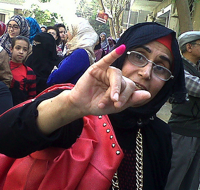The Western news media has made much over the recent decision by Egypt's transitional government to ban foreign election monitors from the country's upcoming parliamentary polls. The more important story, however, has been buried: The transitional regime, which includes no women, has scrapped quotas for women in the national legislature, while retaining them for farmers and workers. In the previous legislature, Egypt's mandatory quota system allowed women to hold approximately 13 percent of the seats -- 64 out of 445. Now, the only protection for women will apply to the half of the new parliament's seats that will be elected by the party list system, for which each party's list must include at least one woman. Where on that list the woman's name must appear is not specified.
Contrast this with recent developments in Tunisia, where the transitional government has decreed that not only must every political party present equal numbers of male and female candidates, but that men and women must alternate on the lists, so that however many seats a party gains will be divided equally between the sexes. In a fascinating turn, some of Tunisia's Islamist parties supported the measure as well.
The scrapping of the electoral quotas in Egypt are not the only ominous news emanating from the country. Islamist parties there are already protesting the intention of a woman politician, Bothaina Kamel, to run for president, stating that it would be against Sharia law. They are also demanding changes to Egypt's Personal Status Law, which has been amended over the past several decades to afford women greater rights in divorce, child custody and other matters of vital importance to women. These amendments were hard-won and bitterly fought. To see them targeted by powerful political elements in the new Egypt is nothing less than heartbreaking. The latest show of political force by Egypt's Islamist groups, in which hundreds of thousands packed into Tahrir Square to support the creation of an Islamic state under Sharia law, strongly implies they will be able to follow through on their threats to women's status.

